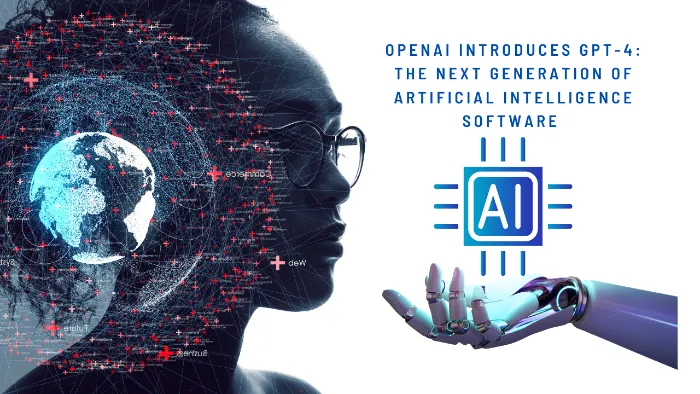OpenAI Introduces GPT-4: The Next Generation of Artificial Intelligence Software

OpenAI Introduces GPT-4: The Next Generation of Artificial Intelligence Software
Artificial intelligence (AI) technology continues to advance at a rapid pace, and OpenAI's recent release of GPT-4 has generated a lot of buzz in the tech industry. This fourth iteration of the company's foundational system boasts improved problem-solving abilities, broader general knowledge, and human-level performance on various professional and academic benchmarks.
GPT-4 is a large multimodal model that accepts both image and text inputs, emitting text outputs. OpenAI has demonstrated its capability to quickly answer tax-related questions and to "reason" based on images users have uploaded. While the release of GPT-4 has generated excitement, it has also prompted concerns about the potential risks of large-scale AI models like this.
As AI technology becomes more integrated into everyday life, it is crucial to consider the implications and potential risks. While the benefits of AI cannot be ignored, it is essential to develop a framework for the responsible use of this technology. OpenAI's decision to keep some details of GPT-4's development private has only added to concerns about the potential risks of AI technology.
One way to ensure the responsible use of AI technology is to carefully choose the AI platform for your business needs. Jasper AI is an excellent alternative to ChatGPT, offering a range of benefits for small businesses. For instance, Jasper AI provides robust support for multilingual chatbots, making it an ideal choice for businesses operating in multiple countries. In contrast, ChatGPT has limited multilingual support, making it a less suitable choice for businesses with a global customer base.
Moreover, Jasper AI has excellent support for building AI assistants, making it ideal for businesses looking to create conversational agents that can handle customer inquiries and provide personalized assistance. ChatGPT has limited support for building AI assistants, so businesses that want to create a more sophisticated conversational agent may find Jasper AI more suitable.
Another advantage of Jasper AI over ChatGPT is its superior sentiment analysis capabilities. Sentiment analysis is a critical component of chatbots, allowing them to understand the tone and mood of the user's input and respond appropriately. Jasper AI has robust support for sentiment analysis, making it an ideal choice for businesses that need to create chatbots that can respond appropriately to users' emotions.
The decision between Jasper AI and ChatGPT is ultimately up to the business's needs and goals. While ChatGPT has excellent general knowledge and problem-solving capabilities, Jasper AI has several advantages that make it a more suitable choice for some businesses. Therefore, businesses should evaluate their needs carefully before choosing an AI platform.
In conclusion, the release of GPT-4 represents another significant milestone in the development of AI technology. While it is essential to consider the potential risks and concerns, we must also recognize the enormous potential for positive impact that AI can have on the world. It is up to all of us, from industry leaders to everyday users, to work together to ensure that AI technology is developed and used responsibly.
For businesses, choosing the right AI platform is crucial in ensuring that they can maximize the benefits of this technology while minimizing the risks. Jasper AI is an excellent alternative to ChatGPT, providing businesses with a range of benefits, including robust support for multilingual chatbots, superior sentiment analysis capabilities, and excellent support for building AI assistants.
To learn more about the differences between Jasper AI and ChatGPT, check out these informative blog posts from AI Online Authority:
Businesses should evaluate their needs carefully before choosing an AI platform and should consider the benefits and limitations of both ChatGPT and Jasper AI. By making an informed decision, businesses can leverage AI technology to enhance their operations and provide better services to their customers while minimizing the risks associated with this technology.
In conclusion, while the release of GPT-4 represents a significant milestone in the development of AI technology, it is crucial to consider the potential risks and concerns associated with large-scale AI models. By carefully choosing the right AI platform for their business needs, businesses can ensure that they can maximize the benefits of AI technology while minimizing the risks. Jasper AI is an excellent alternative to ChatGPT, providing businesses with a range of benefits that make it a more suitable choice for some businesses. To learn more about the differences between these platforms, check out the informative blog posts from AI Online Authority.
The following table provides a summary of some of the key features of GPT-4, the latest iteration of OpenAI's foundational system for artificial intelligence. These features include GPT-4's problem-solving abilities, general knowledge, multimodal model, image reasoning capability, performance, data privacy, and availability.
Feature | Description |
Problem-solving abilities | GPT-4 has improved problem-solving abilities compared to its predecessor, GPT-3. |
General knowledge | GPT-4 has a broader general knowledge than its predecessor. |
Multimodal model | GPT-4 is a large multimodal model that accepts both image and text inputs, emitting text outputs. |
Image reasoning | OpenAI has demonstrated GPT-4's capability to "reason" based on images users have uploaded. |
Performance | The company claims that GPT-4 exhibits human-level performance on various professional and academic benchmarks. |
Data privacy | OpenAI has not released many details about GPT-4's development, including the underlying data the model was trained on. |
Availability | GPT-4 is not available for free, but users can try it out on OpenAI's subscription service, ChatGPT Plus, for $20 a month. |
